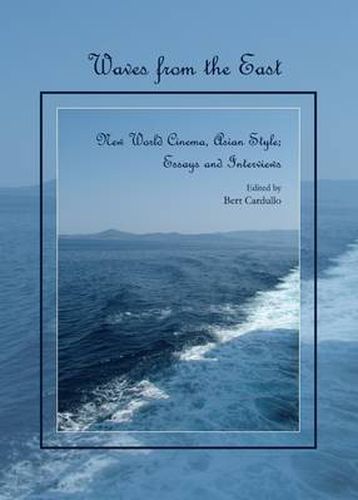Readings Newsletter
Become a Readings Member to make your shopping experience even easier.
Sign in or sign up for free!
You’re not far away from qualifying for FREE standard shipping within Australia
You’ve qualified for FREE standard shipping within Australia
The cart is loading…






This book is a collection of interviews with, and essays about, not so much the two non-Western filmmakers who introduced the cinema of their respective countries to the West-Akira Kurosawa (Japan) and Satyajit Ray (India), in the 1950s-but those who followed in their wake. From among them, I have chosen representative figures from such countries as Iran, China, Japan, Turkey, South Korea, Taiwan, Kurdistan, and Afghanistan: Abbas Kiarostami, Jafar Panahi, Majid Majidi, Bahman Ghobadi, Siddiq Barmak, Samira Makhmalbaf, Mohsen Makhmalbaf, Nuri Bilge Ceylan, Hong Sang-soo, Hirokazu Kore-eda, Jun Ichikawa, Kim Ki-duk, Chen Kaige, Zhang Yimou, and Tsai Ming-liang.Waves from the East: New World Cinema, Asian Style documents an alternative to Western brands of cinema, even as these foreign directors in some instances integrate Western forms, styles, and genres into their own native traditions. As such, these artists could be said to represent a global filmmaking perspective that now, more than ever, this world-and the American nation in particular-can use. In the case of Iranian filmmakers like Panahi, Majidi, Kiarostami, and the Makhmalbafs, it remains to be seen how much artistic freedom they can retain in the increasingly militant theocracy of Iran. As for Chen Kaige, like Zhang Yimou, something also remains to be seen: the extent to which the Communist Chinese authorities have induced him to make politics-free entertainments as opposed to the kind of politically-conscious art films he used to make.Most of the interviews are accompanied by an essay by me on a representative film or films by the director in question. My intent in doing this, of course, is to bounce these writings off a director’s own words, to juxtapose what I think of his work against what he, the filmmaker, thinks of his work.
The essayist and interviewees don’t always agree, but why must we? Moreover, I have tried to select interviews that are as artistically inclusive as possible. That is, the questions focus on practical matters related to filmmaking as much as they do on historical, aesthetic, and critical-theoretical issues raised by the films themselves. Richly illustrated with film stills, Waves from the East concludes with a bibliography, individual filmographies, and a comprehensive index
$9.00 standard shipping within Australia
FREE standard shipping within Australia for orders over $100.00
Express & International shipping calculated at checkout
This book is a collection of interviews with, and essays about, not so much the two non-Western filmmakers who introduced the cinema of their respective countries to the West-Akira Kurosawa (Japan) and Satyajit Ray (India), in the 1950s-but those who followed in their wake. From among them, I have chosen representative figures from such countries as Iran, China, Japan, Turkey, South Korea, Taiwan, Kurdistan, and Afghanistan: Abbas Kiarostami, Jafar Panahi, Majid Majidi, Bahman Ghobadi, Siddiq Barmak, Samira Makhmalbaf, Mohsen Makhmalbaf, Nuri Bilge Ceylan, Hong Sang-soo, Hirokazu Kore-eda, Jun Ichikawa, Kim Ki-duk, Chen Kaige, Zhang Yimou, and Tsai Ming-liang.Waves from the East: New World Cinema, Asian Style documents an alternative to Western brands of cinema, even as these foreign directors in some instances integrate Western forms, styles, and genres into their own native traditions. As such, these artists could be said to represent a global filmmaking perspective that now, more than ever, this world-and the American nation in particular-can use. In the case of Iranian filmmakers like Panahi, Majidi, Kiarostami, and the Makhmalbafs, it remains to be seen how much artistic freedom they can retain in the increasingly militant theocracy of Iran. As for Chen Kaige, like Zhang Yimou, something also remains to be seen: the extent to which the Communist Chinese authorities have induced him to make politics-free entertainments as opposed to the kind of politically-conscious art films he used to make.Most of the interviews are accompanied by an essay by me on a representative film or films by the director in question. My intent in doing this, of course, is to bounce these writings off a director’s own words, to juxtapose what I think of his work against what he, the filmmaker, thinks of his work.
The essayist and interviewees don’t always agree, but why must we? Moreover, I have tried to select interviews that are as artistically inclusive as possible. That is, the questions focus on practical matters related to filmmaking as much as they do on historical, aesthetic, and critical-theoretical issues raised by the films themselves. Richly illustrated with film stills, Waves from the East concludes with a bibliography, individual filmographies, and a comprehensive index